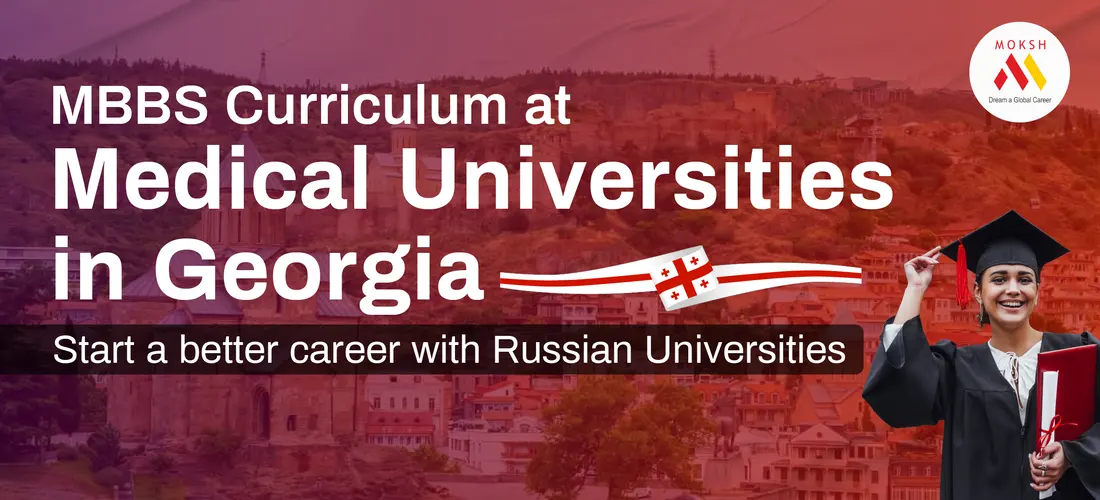
Introduction
Georgia, located in the Caucasus region, has recently grown as an international medical education hub. Its rich cultural heritage and strategic location make it ideal for pursuing a medical degree. MBBS (Bachelor of Medicine and Bachelor of Surgery) programs in Georgia are gaining immense popularity among students worldwide due to their high-quality education, affordability, and global recognition.
Quick Facts
| Factors | Details |
| Eligibility | 50% in PCB, NEET Required |
| Medium of Instruction | English |
| Duration of Course | 5+1 Years |
| Degree Awarded | MD (Equivalent to MBBS) |
| Tuition Fee (Yearly) | INR 4.5 to 7 Lacs |
| Currency | Georgian Lari (GEL) |
| Conversion Rate | 1 GEL = ~30.76 INR |
| Cost of Living | Rs. 12,000 - 15,000 per month |
| Internship | 12 Months |
| University Recognition | NMC/MCI, WHO, ECFMG & GMC UK |
| Intake | September |
Curriculum Structure
The MBBS program in Georgia typically lasts six years and is divided into two main phases: Basic Medical Sciences and Clinical Sciences.
Basic Medical Sciences (First 2.5 Years)
The initial phase focuses on foundational medical knowledge, covering core subjects such as:
- Anatomy: Understanding the human body's structure.
- Physiology: Studying the functions of various body parts.
- Biochemistry: Exploring chemical processes within the human body.
- Genetics: Learning about heredity and the variation of organisms.
- Pathology: Examining diseases and their effects on the body.
This phase is crucial as it provides the essential knowledge required for effective clinical practice in later years.
Clinical Sciences (Last 3.5 Years)
The second phase involves hands-on clinical training and rotations through various medical departments, including:
- Internal Medicine: Diagnosis and treatment of adult diseases.
- Surgery: Learning surgical procedures and techniques.
- Pediatrics: Practice of providing medical care to infants, children, and adolescents.
Students get hands-on experience with case studies, simulations, and direct patient interactions, making sure they are ready for real-world medical practice.
Variations in Curriculum
While the core structure of the MBBS curriculum is consistent across Georgian universities, there can be slight variations. Some universities might emphasise research or offer integration with international programs like USMLE (United States Medical Licensing Examination) preparation. Hence, students can tailor their education based on their career aspirations.

Advantages of the MBBS Curriculum in Georgia
The MBBS curriculum in Georgia offers several advantages that make it an attractive option for international students:
- Practical Skills: Emphasis on clinical skills and patient interaction from an early stage.
- Strong Foundation: Robust primary sciences education that prepares students for specialised medical training.
- Affordability: Lower tuition fees than many Western countries make it an economical choice for quality medical education, positioning Georgia among the most affordable MBBS programs in Europe.
- English Medium Instruction: Georgian medical universities primarily use English as the medium of instruction, making it accessible for international students.
- Focus on Practical Skills: The curriculum emphasises practical skills development through laboratory sessions, workshops, and clinical rotations, which prepares students for real-world medical practice.
- Integration with USMLE Preparation (Optional): Some universities offer integrated programs incorporating USMLE exam preparation alongside the MBBS curriculum. Likewise, it can benefit students aiming to pursue residency programs in the United States.
Exploring the Options: European vs. Integrated American Programs
Most Georgian universities offer two primary program options:
- European Medical Program: This standard program prepares students for the national licensing exam in Georgia or similar exams in their home countries.
- Integrated American Program: This specialised program incorporates USMLE exam preparation alongside the MBBS curriculum, catering to students aspiring for residency programs in the USA.
Advantages of Studying MBBS in Georgia
- Safety: Georgia ranks high in safety among European countries.
- European Education System: Uses the ECTS system, enabling student transfers across Europe without academic loss.
- Compliance with NMC Guidelines: Meets all NMC criteria, allowing graduates to appear for NExT.
- American Integrated Program: Available at select universities like the University of Georgia for USMLE prep.
- Global Recognition: Accredited by WHO, ECFMG, GMC UK, and others.
- Clinical Exposure: Extensive patient interaction and clinical practice during the last 3.5 years.
- English Proficiency: A high level of English understanding among locals facilitates better communication.
Disadvantages of Studying MBBS in Georgia
- Non-EU Membership: Lack of EU membership may limit certain benefits.
- Higher Costs: Tuition and living expenses are relatively higher compared to countries like Russia and China
Top Medical Universities in Georgia
Let’s compare tuition fees for MBBS programs at top Medical Universities in Georgia . This table provides a quick reference in both USD and INR.
| University Name | Tuition Fees / Year (USD) | Tuition Fees / Year (INR) |
|---|---|---|
| University of Georgia (Integrated American Program) | 6000 USD | Rs. 5,01,563 |
| Tbilisi State Medical University | 8000 USD | Rs. 6,68,750 |
| Teaching University Geomedi | 5500 USD | Rs. 4,59,766 |
| Ilia State University | 5900 USD | Rs. 4,93,203 |
| Georgian National University | 5500 USD | Rs. 4,59,766 |
| Georgian American University | 5500 USD | Rs. 4,59,766 |
| David Tvildiani Medical University AIETI | 8000 USD | Rs. 6,68,750 |
| Caucasus University | 6000 USD | Rs. 5,01,563 |
| Alte University | 5000 USD | Rs. 4,17,969 |
| Akaki Tsereteli State University | 4000 USD | Rs. 3,34,375 |
Cost of Living in Georgia for Indian Students
Georgia provides a budget-friendly cost of living for Indian students. Here is a breakdown of the average monthly expenses:
| Expense Type | Cost (GEL) | Cost (USD) |
|---|---|---|
| Transportation (Travel Pass) | 40 - 60 | ~ 15 - 25 |
| Utilities | 120 - 300 | ~ 50 - 120 |
| Rent (1-bedroom) | 800 - 2,500 | ~ 296.0 - 1,002.7 |
| Groceries | 200 - 300 | ~ 75 - 120 |
| Leisure Activities | 50 - 200 | ~ 20 - 75 |
Indian Food and Additional Living Expenses
- Cost of Indian Food: 120 USD - 150 USD per month.
- Cost of Living: $100 to $150 per month for additional expenses.
Conclusion
Studying MBBS in Georgia combines top-quality education, hands-on experience, and affordability. To find the best university for your goals, research thoroughly. For personalised guidance, contact our counsellors at MOKSH to make the right choice.
FAQs
Is the MBBS curriculum in Georgia taught in English?
Yes, most Georgian medical universities use English as the primary language of instruction. Hence, we can say that MBBS in English (medium) is accessible to international students.
What is the duration of the MBBS program in Georgia?
The MBBS program in Georgia typically lasts six years, encompassing both academic study and practical training. It's divided into two main phases: o Basic medical sciences (2.5 years) o Clinical sciences (3.5 years) Following the classroom and clinical components, there's a mandatory one-year internship at a university-affiliated hospital. This internship provides hands-on experience and helps solidify the knowledge gained throughout the program.
CaDoes the MBBS degree awarded in Georgia have global recognition?
Yes, MBBS degrees from Georgia are recognised by many international organisations, such as WHO, ECFMG, and GMC UK, allowing graduates to pursue careers worldwide.
Do some universities in Georgia offer MBBS programs with USMLE preparation?
Some universities offer integrated programs that incorporate USMLE exam preparation alongside the MBBS curriculum. Indeed, these programs are ideal for students aiming for residencies in the USA.
How much does it cost to study MBBS in Georgia?
Tuition fees for MBBS programs in Georgia range from INR 4.5 to 7 Lacs annually. The overall cost depends on factors like the university chosen, program type (European or Integrated American), and living expenses.
What are the living expenses for MBBS students in Georgia?
Living expenses for MBBS students in Georgia are relatively affordable. You can expect to spend between Rs. 12,000 - 15,000 per month on accommodation and basic necessities.
Is it easy to find Indian food in Georgia?
Yes, there are options for Indian food in Georgia. The cost can range from USD 120 to USD 150 per month.









